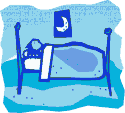Your Rest Is up to You: Sleeping and your Health

Why do we sleep? Scientists still are not exactly sure what the answer is. What we know for sure is that we definitely need rest. Yet humans are a peculiar species – in our rush to get an assignment done or squeeze in one more social outing, we often intentionally deprive ourselves of relaxation.
Students aged five to twelve years old get around 9.5 hours of sleep on average, which is just shy of the 10 or 11 hours that experts recommend. This is as detrimental to health as skipping meals or a lack of exercise. Getting rest allows the body to repair many of its functions, including healing, growth, and the immune system. We get irritated when hungry and have a harder time getting moving with less physical activity. Similarly, sacrificing rest negatively affects memory, mood, alertness, and responsiveness. The benefits gained from a couple of extra hours of studying or socializing are frequently outweighed by the consequences of the rest we were deprived of.
School, work, and social responsibilities will not simply disappear. However, there are a few steps you can take now to help give yourself a bit more rest. Get some exercise during the day. An intense workout right before bedtime will make you too alert to sleep, but cardio, strength training, hiking, or running in the morning or afternoon can be very helpful. This aids your body in general and will actually provide better rest come nighttime.
Caffeine is an obvious culprit of sleep deprivation, but it can also disrupt rest even if you consume it earlier in the day. Caffeine from coffee, tea, and soft drinks lingers inside of you for hours and can cause havoc on your body’s natural rhythms. If you are having difficulties relaxing, consider cutting caffeine out of our diet entirely.
Pay extra attention to your diet in general. Eating a large breakfast helps prevent overeating at night or trying to relax with too little food in your system. This discomfort can prevent your body from optimal rest. When you are ready for a respite, ensure you have an ideal space for that. Do all your homework at a desk or in a room other than your bedroom to ensure the bed itself is only used for relaxation and sleep. This will help your body associate the bed with that purpose.
In the evening, turn off all screens or change your phone’s brightness to warmer colours. Build a nighttime routine, such as a cup of tea followed by brushing your teeth, and stick to that regime daily. Your mind will associate those actions with rest, and in turn help ease you away from the stresses of the day.
Giving your body a chance to recover is critical for succeeding in the things you want to do when rested. Little changes to your routine can make a big difference. With a more prepared and recovered body, your days will be filled with much more potential.
Sources:
KidsHealth. What Sleep Is and Why All Kids Need It. http://kidshealth.org/en/kids/not-tired.html
NHS. Children’s sleep. http://www.nhs.uk/livewell/childrenssleep/Pages/childrenssleephome.aspx
Secor, Melinda. Why Is Rest & Exercise Important for Children? LiveStrong. http://www.livestrong.com/article/344565-why-is-rest-exercise-important-for-children/





Leave a comment!